
Policy for the Poor? Phnom Penh, Tenure Security & Circular 03
Publication Year: 2013 / Sources: The Urban InitiativePhnom Penh’s urban poor are under threat. Over the past two decades, 11% of the city’s current population has been displaced, often forcibly evicted, to poorer futures. A key government argument – when such arguments have been provided – has been that many of those affected have been illegal squatters, living on state public land. Habitually, however, there is no assessment of whether or not the occupants have rights to the land as legal possessors.
Download: English | Khmer
The Phnom Penh Rental Survey: A Study on Poor Rental Housing in Phnom Penh
Publication Year: 2014 / Sources: Sahmakum Teang Tnaut (STT)In the current development and economic climate of Cambodia, urbanization plays a major role. The promise of employment, savings, and a secure future has driven rates of urbanization to be amongst the highest in the South-East Asia region.The speed of growth in Phnom Penh has brought increased urban poverty, as scarcity of land and appropriate housing and urban infrastructure pushes residents into precarious housing situations.
Download: English | Khmer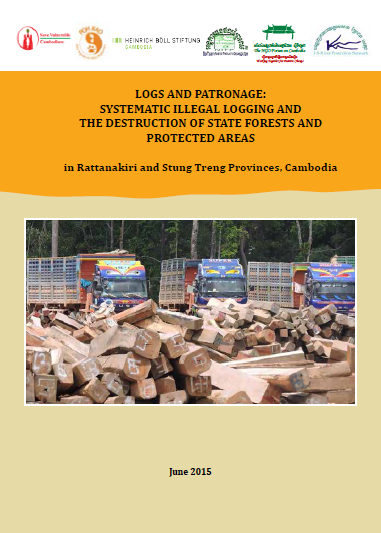
Logs and Patronage: Systematic Illegal Logging and the Destruction of State Forests and Protected Areas in Rattanakiri and Stung Treng Provinces, Cambodia
Publication Year: 2015 / Sources: The NGO Forum on CambodiaThis report presents results of research into the destruction of forests and natural resources in Rattanakiri and Stung Treng Provinces, Cambodia. Over a number of months the researchers collected evidence and legal documentation, often working under dangerous and life-threatening conditions to record the activities of the luxury timber trade.
Download: English | Khmer
Reflection on the Strategies to Support Small Landholders: Through the Review of National Strategic Development Plan (NSDP) , Key Informant Interviews and Case Studies
Publication Year: 2015 / Sources: The NGO Forum on CambodiaThe objectives are to conduct research on priorities that the NSDP gives to smallholders and large scale land concessionaires with the advantages and disadvantages of these two approaches to agricultural development to be compared.
Download: English | Khmer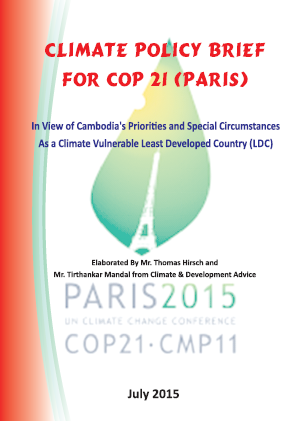
Climate Policy Brief for Cop21 Paris: In View of Cambodia’s Priorities and Special Circumstances As a Climate Vulnerable Least Developed Country (LDC)
Publication Year: 2015 / Sources: DIPECHO consortium & The NGO Forum on CambodiaThis policy briefing aims at supporting Cambodia’s positioning and active participation in 2015 climate talks leading to COP 21 in Paris. It is written with a view on Cambodia as one of the most climate vulnerable countries of the world.
Download: English | Khmer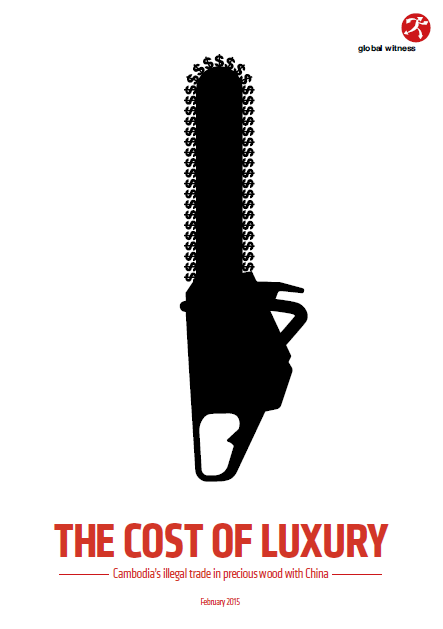
The Cost of Luxury: Cambodia’s illegal trade in precious wood with China
Publication Year: 2015 / Sources: Global WitnessCambodia is reported to have the fifth highest deforestation rate in the world. In 1970, forests covered approximately 70 percent of the country’s territory but by 2013 total tree cover (including plantations) was estimated at only 43 percent.
Download: English | Khmer
Cambodia: The Bitter Taste of Sugar Displacement and Dispossession in Oddar Meanchey Province
Publication Year: 2015 / Sources: Oxfam & ActionAidLand has been the single most contentious issue in Cambodia with Economic Land Concessions or ELCs the biggest conduit for land grabs in the last two decades. This research study focused exclusively on the sugar concessions in Oddar Meanchey Province.
Download: English | Khmer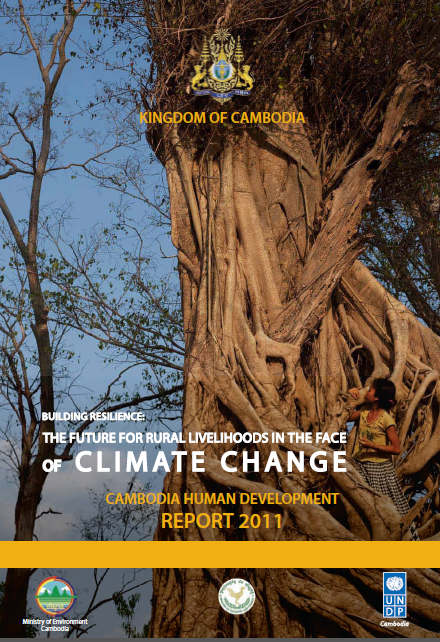
Cambodia Human Development Report 2011: The Future of Rural Livelihoods in the Face of Climate Change
Publication Year: 2011 / Sources: Ministry of Environment of Cambodia & UNDP CambodiaThe focus in this Cambodia Human Development Report (CHDR) is on climate change and rural livelihoods. While this captures only part of the picture of climate change in Cambodia, it is an essential starting point. Even though Cambodia is changing rapidly and the distinctions between rural and urban are becoming less clear, most people continue to depend on a rural economy and natural resources.
Download: English | Khmer
Population Monitoring of The Critically Endangered Mekong Dolphin Based on Mark-Resight Models
Publication Year: 2015 / Sources: World Wide Fund for Nature (WWF) & Fisheries Administration (FiA)Research that is one of the five main components of the Cambodian Mekong Dolphin Conservation Strategy has been collaboratively conducting by the Fisheries Administration (FiA) and World Wide Fund for Nature (WWF) in the Mekong Dolphins’ Managerial Protection Zone under the Cambodian Royal Government’s Sub-Decree since 2005.
Download: English | Khmer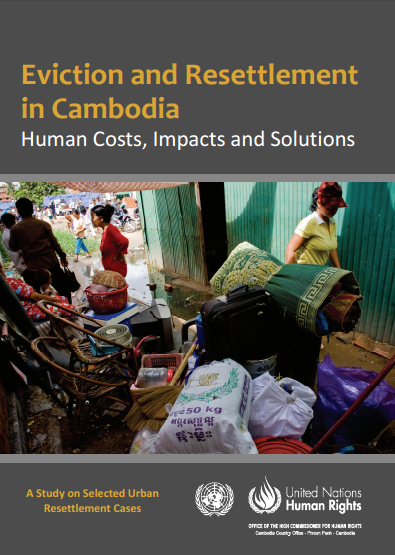
Eviction and Resettlement in Cambodia: Human Costs, Impacts and Solutions
Publication Year: 2012 / Sources: Office of the United Nations High Commissioner for Human Rights Cambodia Country OfficeThe Office of the UN High Commissioner for Human Rights in Cambodia (OHCHR) has undertaken the present Study to measure the human and socio‐economic costs and impacts of eviction and resettlement in Cambodia, and
explore solutions based on The Royal Government’s domestic laws and policies and international human rights treaty commitments.
